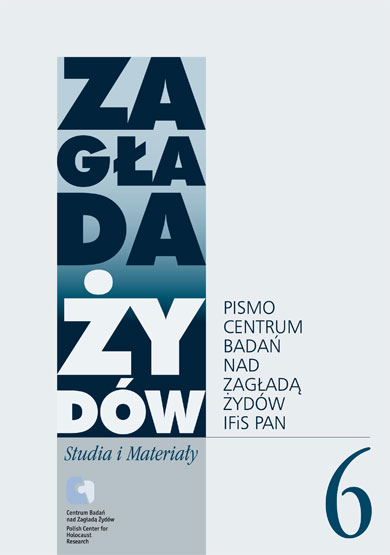Lagry w perspektywie genderowej
Zagłada Żydów. Studia i Materiały, No. 6 (2010), Pages: 193-204
Submission Date: 2020-12-06Publication Date: 2010-12-30
 https://doi.org/10.32927/zzsim.716
https://doi.org/10.32927/zzsim.716
Abstract
The questions of corporality, sexuality, women’s experience and their record examined in the context of camp issues and the Holocaust have only recently become the subject of attention. Gender studies play a significant role in the discussion on those issues. Existing works on the subject (i.a. the book of Bożena Karwowska Ciało. Seksualność. Obozy zagłady [Gender, Sexuality, Concentration Camps]) show that the tools of gender studies are cognitively useful, but, as it appears, their role of being particularly predestined to uncover what is marginalized or condemned to silence is overestimated. Nevertheless, apart from the dominance of the patriarchal discourse, there have always existed other reasons for suppressing the matter of corporality and sexuality both in works on KL’s and in science; social taboo (controlled not only by the male symbolical order) as well as the policy (e.g. it was possible to
write openly about rape on former female prisoners by Soviet soldiers only after censorship had been lifted) play an important role here. The fundamental value of the gender perspective lies in the firm approach towards the issues hitherto marginalized in the KL context – both by science and, to a lesser extent, literature (which is reflected by i.a. works of Pankowski and Posmysz published years ago).
License
Copyright (c) 2010 Author&"Holocaust Studies and Materials"

This work is licensed under a Creative Commons Attribution 4.0 International License.
https://creativecommons.org/licenses/by/4.0
The journal is published under the Diamond Open Access Standard, CC-BY-4.0 Deed - Attribution 4.0 International - Creative Commons
Similar Articles
- Peter Black, The Sonderdienst in the General Government , Zagłada Żydów. Studia i Materiały: No. 12 (2016)
- Lars Jockheck, From Agent to Collaborator? The Collaboration of the Jewish Journalist Fritz Seifter of Bielsko with the German Authorities in the 1930s and the 1940s. , Zagłada Żydów. Studia i Materiały: No. 2 (2006)
- Wendy Lower, Male and Female Holocaust Perpetrators and the East German Approach to Justice, 1949–1963 , Zagłada Żydów. Studia i Materiały: No. 8 (2012)
- Judith Lyon-Caen, Michel Borwicz: Between Poland and France, Between Literature and History , Zagłada Żydów. Studia i Materiały: No. 13 (2017)
- Heléna Huhák, András Szécsényi, Cavalcade of Interpretations: The Kasztner train Through the Self-narratives of the Fugitives , Zagłada Żydów. Studia i Materiały: No. 18 (2022)
- Natalia Aleksiun, When Fajga Left Tadeusz. Wartime Relationships of Survivors after the Holocaust , Zagłada Żydów. Studia i Materiały: No. 17 (2021)
- Zofia Wóycicka, Holocaust Laboratory – New Historical Exhibition at the Former Kulmhof Death Center in Chełmno nad Nerem , Zagłada Żydów. Studia i Materiały: No. 16 (2020)
- Natalia Aleksiun, Historiography of the Holocaust on the Polish-Jewish relations in Poland , Zagłada Żydów. Studia i Materiały: No. 1 (2005)
- Małgorzata Grzanka, “Besides, the despair of the people being deported was terrible; you could hear their crying, lamenting, and pleas.” The crime committed against Polish nursing home residents in Włocławek (spring–summer 1942) , Zagłada Żydów. Studia i Materiały: No. 21 (2025)
- Karolina Sulej, Jacek Leociak, “He Smiled at Me and Sent Kisses with His Hand”. On Dora Sztatman’s testimony , Zagłada Żydów. Studia i Materiały: No. 5 (2009)
1 2 3 4 5 6 7 8 9 10 11 12 13 14 15 16 17 18 19 20 21 22 23 24 25 26 27 28 29 30 31 32 33 34 35 36 37 38 39 40 41 42 43 44 45 46 47 48 49 50 > >>
You may also start an advanced similarity search for this article.
 English
English
 Język Polski
Język Polski








